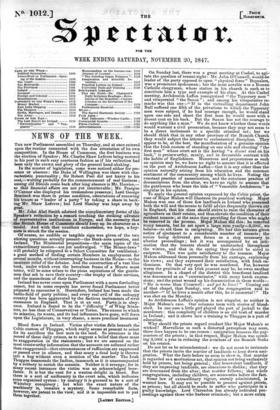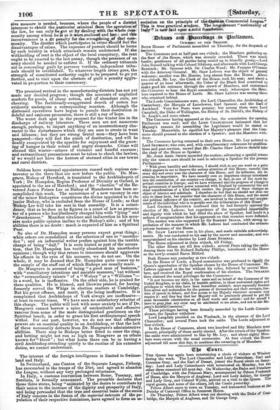Blood flows in Ireland. Victim after victim falls beneath the
Celtic custom of Thuggee, which really seems at present to select for its sacrifices the best men in the land. So atrocious is the record of these daily crimes, as to suggest a belief that there must be exaggeration in the statements ; but we are assured on the most trustworthy information that the accounts are softened rather than exaggerated—that circumstances of ruffianism are suppressed or passed over in silence, and that many a dead body is thrown into a bog without even a mention of the murder. The Irish Thuggee transcends the Indian, inasmuch as it is unaccompanied by a robbery to enrich the assassin. Neither is it revenge; for in many recent instances the victim was an acknowledged bene- factor. It is but the vent for a wanton delight in blood. But there is a sort of uniformity in the overt acts, which indicates some organized system : by analogy it is guessed to be a sort of Whiteboy conspiracy ; but what the exact nature of the machinery is, remains a mystery. Some remarkable facts, however, are patent to the view, and it is impossible not to put them together. On Sunday last, there was a great meeting at Cashel, to agi- tate the question of tenant-right : Mr. John O'Connell, would-be leader of the party opposed to open " physical force" Repealers, was a prominent spokesman ; but the most notable was a Roman Catholic clergyman, whose station in his church is such as to constitute him a type and example of his class. At this Cashel meeting, Archdeacon Laffan panegyrized "the Tipperary men" and vituperated "the Saxon "; and among his vituperative re- marks was this one—" If in the victualling department John Bull suffered one fifth of the privations to which the Tipperary men were subject, if he had courage enough, lie would stand upon one side and shoot the first man he would meet with a decent coat on his back. But the Saxon has not the courage to do anything like a man." We do not know whether these words would warrant a civil prosecution, because they may not seem to be a direct incitement to a specific criminal act; but we should think that in any other province of the Romish Church they would subject the utterer to ecclesiastical discipline. They appear to be, at the best, the manifestation of a genuine opinion that the Irish custom of standing on one side and shooting "the first man" whose overt act is the having. "a decent coat on his back," is praiseworthy, manly, and in favourable contrast with the habits of Englishmen. Monstrous and preposterous as such an opinion may be, we have no right to assume that it is affected on the part of Archdeacon Laffan—that it is any other than the opinion naturally arising from his education and the common sentiment of the community among which he lives. Noting the constant practice of assassination, and the notorious practice of denunciations from the altar, we have no right to assume that the gentleman who bears the title of " Venerable Archdeacon" is singular in his opinion.
To apply the general opinion expressed by the Celtic priest, the case of Major Mahon will illustrate its practical working. Major Mahon was one of those few landlords in Ireland who possessed both the will and the means to fulfil advice frequently thrown out in England, that his class should strive to raise the character of agriculture on their estates, and thus elevate the condition of their resident tenants; at the same time providing for those who might be removed in the process. Major Mahon did this : he removed many tenants, but he set apart a large sum yearly-3,5001., we believe—to aid them in emigrating. He had this autumn given notice of ejectment to a considerable number of tenants; the notice being delivered pro forma as a step necessary to ulterior proceedings ; but it was accompanied by an inti- mation that the tenants should be undisturbed throughout the winter, and that in the spring they should be aided to emigrate. This was quite satisfactory to the tenants. Major Mahon addressed them personally from his carriage, explaining his views ; and they expressed their satisfaction, with Irish en- thusiasm. On that very spot he was murdered. For, however warm the gratitude of an Irish peasant may be, he owes another allegiance. In a chapel of the district this beneficent landlord was denounced as an "exterminator," with many harsh expres- sions; and the priest wound up his denunciation in these words- " He is worse than Cromwell : and yet lie lives! " Coming out of that chapel, that Sunday, one of the congregation said to another—" If he lives a month after this, he is immortal !" He was shot on the Monday.
As Archdeacon Laffan's opinion is not singular, so neither is Major Mahon's case. Our columns teem with stories of blood- shed. In one case a little girl played the part of jackall to the murderers : this complicity of children is an old trait of murder in Ireland ; and it shows how a training to Thuggee is a part of education.
Why should the priests regard conduct like Major Mahon's as wicked ? Marvellous as such a distorted perception may seem, there does happen to be one reason : emigration removes the pay- masters of the priests ; in that respect, Major Mahon was spend- ing 3,5001. a year in reducing the nambers of the Romish flocks on his estates.
Do not let us be misunderstood : we do not mean to insinuate that the priests incite the murder of landlords to keep down emi- gration. What the facts before us seem to show is, that murder is regarded as a meritorious act, that opinion not being exclusively held by priests, but being general ; that benevolent landlords, if they are improving landlords, are obnoxious to dislike; that they are denounced from the altar; that murder follows; that whole congregations, including children, are accessories before the fact. Some law of extraordinary vigour, sternly administered, is wanted here. It may not be possible to proceed against priests, as priests; but all should be made to suffer who participate in a guilty knowledge. Lord Clarendon has already indicated pro- ceedings against those who harbour criminals; but a more eaten sive measure is needed, because, where the people of a district interpose to shield the particular criminal from the operation of the law, he can only be got at by dealing with the whole com- munity among whom he is as it were enclosed and lost : and this inconvenience is a fit penalty for the wrongdoing of that com- munity. The district which participates in crime should feel the disadvantages of crime. The expenses of pursuit should be borne by each locality in which criminals remain undetected. If.,the withholding of rent is the object of the local conspiracy, the rent ought to be exacted to the last penny, though the presence of an army should be needed to enforce it. If the ordinary tribunals aid in concealing guilt by perverse verdicts, independent tribu- nals should be established. To whatever length crime goes, the strength of constituted authority ought to be prepared to go yet further, and to visit upon the abettors of guilt a penalty aggra- vated in proportion to their contumacy.



























